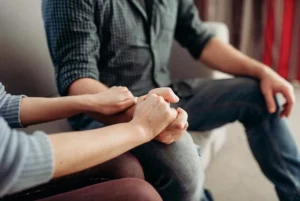Marriage is a captivating and fulfilling voyage, but it’s not without its challenges. Every couple goes through ups and downs, and sometimes these tribulations can strain the bond between partners. Marriage counseling provides a safe space for couples to explore their issues, improve communication, and develop strategies to build a stronger, healthier relationship. In this article, we will delve into the world of marriage counseling, its benefits, and how it can contribute to the longevity and happiness of a marriage.
Contents
Understanding The Importance of Marriage Counseling
 Marriage counseling plays a paramount role in helping partners to overcome challenges, bolster their affinities, and enhance their overall well-being.
Marriage counseling plays a paramount role in helping partners to overcome challenges, bolster their affinities, and enhance their overall well-being.
Here are some key reasons why marriage counseling is important:
- Improved Communication: Effective communication is essential for a healthy relationship. Marriage counseling provides a safe space for couples to learn and practice better communication skills. It helps partners express their needs, concerns, and emotions in a constructive manner while promoting active listening and understanding.
- Conflict Resolution: Conflict is a natural part of any relationship, but unresolved conflicts can damage the relationship over time. Marriage counseling equips couples with techniques to manage conflicts, find common ground, and resolve disagreements in a respectful and healthy way. Learning how to navigate conflicts strengthens the bond between partners.
- Strengthened Emotional Connection: Marriage counseling focuses on rebuilding emotional intimacy and connection. It helps couples explore their emotions, deepen their understanding of each other, and foster empathy and support. By addressing emotional barriers, couples can reconnect and strengthen their bond.
- Enhanced Problem-Solving Skills: Marriage counseling equips couples with problem-solving techniques and strategies to address challenges together. It encourages collaborative decision-making, helping couples find practical solutions to issues related to finances, parenting, household responsibilities, and more. Developing effective problem-solving skills fosters a sense of teamwork and mutual support.
- Emotional and Mental Well-being: A troubled relationship can take a toll on an individual’s emotional and mental well-being. Marriage counseling prioritizes the overall well-being of both partners. By addressing relationship difficulties and finding solutions, couples can experience increased happiness, reduced stress, and improved mental health.
It’s important to remember that seeking marriage counseling is not an admission of failure or an indication that the relationship is doomed. On the contrary, it shows a willingness to invest in the relationship and work towards its improvement.
What Is The Process Of Marriage Counseling
 The process of marriage counseling typically involves several stages aimed at addressing the specific needs and concerns of the couple. While the exact process may vary depending on the therapist and the couple’s situation.
The process of marriage counseling typically involves several stages aimed at addressing the specific needs and concerns of the couple. While the exact process may vary depending on the therapist and the couple’s situation.
Here is a general outline of what to expect:
- Initial Assessment: The first step is an initial assessment, where the therapist gathers information about the couple’s history, relationship dynamics, and current concerns. This may involve individual interviews with each partner or a joint session. The therapist aims to gain a comprehensive understanding of the couple’s unique challenges and goals.
- Goal Setting: The therapist works with the couple to establish clear goals for therapy. These goals may include improving communication, resolving conflicts, rebuilding trust, enhancing intimacy, or addressing specific issues. Setting goals helps guide the therapy process and provides a sense of direction.
- Exploration and Understanding: The therapist facilitates open and honest discussions to explore the underlying issues and dynamics within the relationship. This may involve examining patterns of communication, past experiences, and individual perspectives. The goal is to gain a deeper understanding of the factors contributing to the current challenges.
- Processing and Healing: Marriage counseling provides a safe space for partners to express their emotions, process past hurts, and heal relationship wounds. The therapist facilitates this process by fostering empathy, validation, and understanding. Couples are encouraged to express their feelings and experiences openly and to listen attentively to their partner’s perspective.
- Consolidation and Maintenance: Towards the end of therapy, the therapist assists the couple in consolidating the progress made and integrating the new skills and insights into their daily lives. The couple learns strategies for maintaining a healthy relationship, preventing relapses, and continuing to grow together.
It’s crucial to remember that both couples must actively participate in the process of marriage counseling in order for it to be successful. Positive outcomes and long-lasting relationship improvements are more likely for couples who are prepared to put time, effort, and vulnerability into the process.
What To Expect in Marriage Counseling Sessions
 Here’s what you can generally expect during marriage counseling sessions:
Here’s what you can generally expect during marriage counseling sessions:
- Confidentiality and Safe Space: Marriage counseling sessions provide a confidential and safe space for couples to discuss their concerns openly. The therapist ensures that all discussions within the therapy room remain confidential, promoting an atmosphere of trust and vulnerability.
- Active Listening and Validation: The therapist actively listens to both partners, providing validation and empathy for their experiences and emotions. Each partner has an opportunity to express their thoughts, feelings, and concerns without interruption.
- Structured Sessions: Marriage counseling sessions typically follow a structured format. The therapist guides the conversation, ensuring that both partners have an equal opportunity to speak and be heard. They may use various therapeutic techniques, interventions, or exercises tailored to the couple’s needs.
- Exploration of Emotional Dynamics: Marriage counseling delves into the emotional aspects of the relationship. The therapist helps couples explore their emotional needs, vulnerabilities, and attachment styles. This exploration fosters a deeper understanding of each other’s feelings and promotes emotional intimacy.
- Gradual Resolution and Closure: As couples make progress and achieve their desired outcomes, marriage counseling gradually transition toward closure. The therapist helps the couple consolidate the changes made, encourages ongoing maintenance of their improved relationship dynamics, and discusses strategies for addressing future challenges independently.
Remember, the specifics of marriage counseling sessions may vary depending on the therapist’s approach and the unique needs of the couple. It’s essential to openly communicate with your therapist and ask any questions you may have to ensure a clear understanding of the process and what you can expect in your specific sessions.
Common Misconceptions About Marriage Counseling
Marriage counseling, like any form of therapy, can sometimes be misunderstood or surrounded by misconceptions. Here are some common misconceptions about marriage counseling:
The Therapist Will Provide All the Solutions
Marriage counseling is not about the therapist providing all the solutions or telling couples what to do. Instead, the therapist guides and facilitates the process, helping couples gain insights, develop effective strategies, and make their own decisions. The solutions and changes come from the collaborative efforts of the couple.
It Guarantees Relationship Success
 Marriage counseling does not guarantee that a relationship will be saved or become successful. The outcome of therapy depends on various factors, including the level of commitment, willingness to change, and the complexity of the issues. It’s important to have realistic expectations and understand that therapy provides tools and support.
Marriage counseling does not guarantee that a relationship will be saved or become successful. The outcome of therapy depends on various factors, including the level of commitment, willingness to change, and the complexity of the issues. It’s important to have realistic expectations and understand that therapy provides tools and support.
The Therapist Will Take Sides
The misconception that the therapist will take sides in marriage counseling implies the mistaken belief that the therapist will show favoritism towards one partner over the other. However, in reality, marriage therapists maintain a neutral and unbiased stance, ensuring equal support and guidance for both partners throughout the counseling process.
It’s a Quick Fix
Marriage counseling is not a quick fix for relationship problems. It requires time, effort, and commitment from both partners. It’s important to understand that therapy is a process, and significant changes may take time to occur. Consistency, patience, and active participation are key to achieving positive outcomes.
It’s a Sign of Failure
Seeking marriage counseling is not a sign of failure or admitting defeat. It shows a willingness to invest in the relationship, address challenges, and work toward positive change. Marriage counseling is a proactive step towards improving the relationship and strengthening the bond between partners.
It’s Too Expensive
Cost can be a concern when it comes to therapy, but it’s important to explore options and discuss fees with potential therapists. Many therapists offer sliding scale fees or have resources for low-cost counseling. Additionally, investing in the well-being and health of the relationship can have long-term benefits that outweigh the initial costs.
Choosing The Right Marriage Counselor Near Me
 When selecting a marriage counselor near me, it’s essential to consider several factors to ensure you find the right fit for your needs.
When selecting a marriage counselor near me, it’s essential to consider several factors to ensure you find the right fit for your needs.
Here are some steps to help you choose the right marriage counselor:
- Research: Start by researching marriage counselors in your area. You can ask for recommendations from friends, family, or healthcare professionals. Online directories and therapist finder websites can also provide a list of counselors near you.
- Check Credentials and Specialization: Look into the counselor’s credentials, qualifications, and experience. Ensure they are licensed and have specific training or specialization in marriage or couples therapy. This expertise will ensure they have the necessary skills to address your relationship concerns.
- Consider Approach: Different therapists may have varying therapeutic approaches. Read their profiles or websites to understand their therapeutic orientation, such as cognitive-behavioral therapy, emotionally-focused therapy, or solution-focused therapy. Consider which approach aligns with your preferences and values as a couple.
- Read Reviews: Read reviews or testimonials from previous clients to get a sense of their experiences. Additionally, you can ask for recommendations from trusted sources who have had successful experiences with marriage counseling.
- Evaluate Availability: Consider practical factors such as the counselor’s location, office hours, and fees. Assess whether their availability aligns with your schedules and if their fees are within your budget. Some counselors may offer sliding scale fees or accept insurance, so it’s worth exploring those options.
- Schedule Initial Consultations: Many therapists offer initial consultation sessions either in person or over the phone. Use this opportunity to ask questions, discuss your concerns, and gauge the therapist’s approach and rapport. Assess whether you feel comfortable and understood by the therapist during this meeting.
Remember, finding the right marriage counselor may require some trial and error. If, after a few sessions, you feel that the counselor is not the right fit for you, it’s okay to explore other options.
Conclusion
In conclusion, marriage counseling serves as a valuable resource for couples facing challenges in their relationship. It provides a safe and supportive space for open communication, conflict resolution, and personal growth. Through professional guidance, couples gain insights into their dynamics, learn effective communication skills, and develop strategies to strengthen their bond. Marriage counseling promotes understanding, empathy, and compromise, helping couples rebuild trust and revive their love and commitment. With dedication and willingness to work together, couples can find hope, healing, and a path toward a healthier and happier future together.
Marriage is a beautiful journey, However, every marriage encounters challenges. If you have any queries regarding Online Marriage Counseling experienced therapists at CoupleMantra can help: Book a trial couple therapy session.


